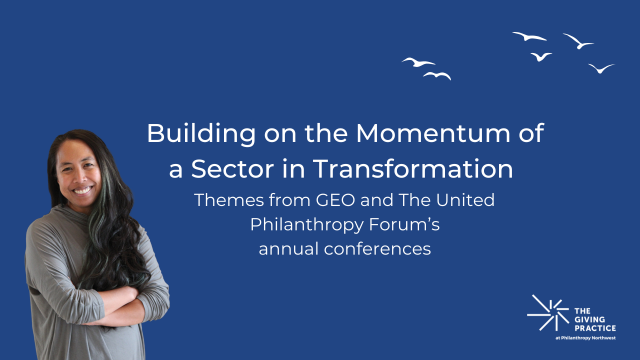“I felt so alone in the Detention Center. I couldn’t believe that people in my community were working to help me. I’m so grateful for help paying my bond, I never thought that would be possible. I know I would be murdered if I was deported.” - Bellingham neighbor, upon release from the Tacoma Detention Center
Recently I met with families whose lives were torn apart by a recent Immigrant and Customs Enforcement (ICE) raid in Bellingham, Washington. Early in the morning of August 29 at least 16 people from the same employer were arrested by ICE and sent to the Tacoma Detention Center. The raid was done quietly and quickly in the dark of early morning before people arrived at work. You probably haven’t heard or read about it in the news, most people in Bellingham don’t even know it happened.
The Whatcom Community Foundation was invited to sit at the table with these families to connect them with funding and resources from caring community members. When we met last week for a working dinner, we were all so caught up in seeing the joy of families reunited, and the pain and sadness of those still (and perhaps forever) separated that we forgot to eat. People shared stories, offered hope and talked about what they needed to move forward as children ran around our feet and babies slept. Sustenance seemed an afterthought.
With permission from the family members, I want to share with you a little bit about what our neighbors are experiencing as they navigate the road to permanent citizenship, work visas, asylum, or deportation. It’s a journey filled with many costs, only some financial.
First, imagine:
* You walk out your front door after your husband has left for work, only to find the car running, door open, and he has vanished.
* Your dad leaves for work the day before you start 1st grade, and he never returns home.
* You have a four-week-old baby, your husband is detained, and you don’t know when or if he will come home.
* Your dad fled violence in your home country and was detained in another state for almost three months before being released on bond (exhausting the families savings). He makes it to Bellingham and hugs you for the first time in 5 years. You are detained the following day.
How would you feel if:
* Within the first month of your husband being in detention you lost your housing and moved in with your parents. As a result, your eight-year-old daughter may have to switch schools.
* You were too scared to go to the food bank; apply for public support; or go to school.
* You were a high school senior and your stepfather gets detained and deported, so you drop out of school to work so you can provide for your ailing mother and four younger siblings.
* You were released on an immigrant bond, but it is $18,000 and your route to citizenship will cost an additional $12,500 in attorney fees.
* You were deported, separated from your family without even one dollar in your pocket.
* You fled violence in your home country of Honduras, started a new life and family in Bellingham, and the day you are to be deported your fifteen-year-old brother is murdered in your home country.
* You were working on getting your green card to work legally in the US and you are arrested and detained for a week, only to be released after posting $6,000 in bail and paying $2,500 in legal fees.
What would you do if you were:
* A doctor, and your 5-month pregnant patient tells you about the deportation of her father and brother in the ICE raid.
* Living with someone who contributes half of the rent, and they are sent to a detention center and cannot pay their portion four days before the rent is due.
* An employer and more than 16 people do not show up for work one day, and you must let another 28 go three weeks later because they do not have the proper documentation to work in the US.
* A teacher in one of the many classrooms across three school districts in which students were suddenly separated from their fathers.
Now, picture this:
* Families coming together to support each other, problem solve, and prioritize how scarce funds are equitably distributed.
* Faith communities responding with safe-haven, a warm meal, and the commitment to help in whatever ways they are able.
* People you’ve never met help pay your immigration bond, and someday you repay it so that someone else who will share your experience may use it.
* A local immigration attorney speaks fluent Spanish and offers to take your case at a significant discount.
* The food bank delivers a huge box of fresh, nutritious food to your home.
* Someone puts $50 in your commissary account at the detention center before you are deported.
* A Spanish speaking children’s mental health counselor volunteers to meet with your family and others to help you learn how to talk to your children about their separation from a parent.
* A complete stranger gives you their laptop computer, so you can start working on your nursing degree.
This is a long list. I considered culling it to fewer examples but each of these stories represents a person and a family that – whether I’ve met them in person or not – is now a part of my experience. They are each essential elements of the aftermath of this raid. Deleting even one of them feels wrong. Ripples from these events touch all of us, and the stories of suffering and generosity are growing.
Our job right now is to lift up people’s voices, and raise money for legal aid, immigration bail bonds and general relief for things like food, housing and healthcare. Thanks to the generosity of people moved to action by this action and its consequences, the Community Foundation has been able to buoy families by making funds available to pay immigrant bonds (ranging from $6,000-$18,000) and legal fees (sometimes $12,000 or more); and connect people with resources to help them rebuild their lives. Meanwhile, three people remain in the Tacoma Detention Center, awaiting legal proceedings; seven people have been, or will be deported, leaving behind families; and none of the people released on bond has had a hearing regarding their permanent status.
Our community’s responders include key philanthropic and community partners: Community to Community Development, Bellingham Unitarian Fellowship; Northwest Immigrant Rights Project, LAW Advocates, Columbia Legal Services, Greater Tacoma Community Foundation, Catholic Community Services, and Bellingham Food Bank.
We invite you to hold and share these stories. They are part of the human fabric that, especially when torn, reminds us that we have much work to do to achieve a true culture of philanthropy.
Pamela Jons is Executive Vice President of the Whatcom Community Foundation. The Whatcom Community Foundation hosted a Philanthropy Interrupted Talk at the recent Philanthropy Northwest Annual Conference in Boise, on how philanthropy can assist immigrant communities in navigating the path to permanent citizenship.


